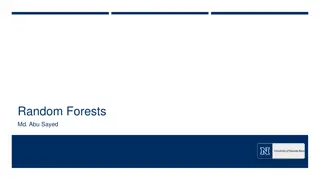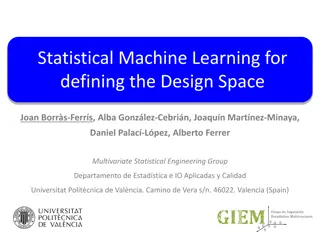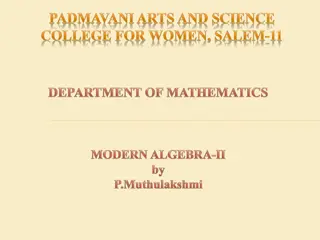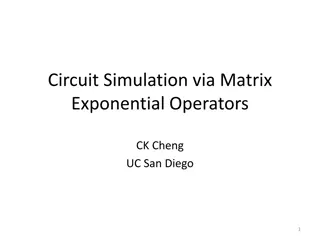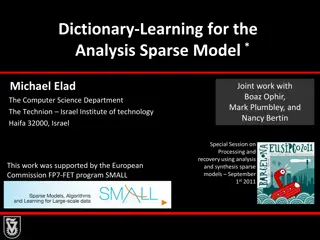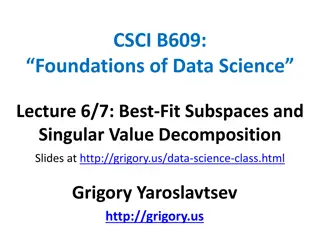Random Forests: A Comprehensive Overview
Random Forests, a popular ensemble learning technique, utilize the wisdom of the crowd and diversification to improve prediction accuracy. This method involves building multiple decision trees in randomly selected subspaces of the feature space. By combining the predictions of these trees through a
5 views • 21 slides
Subspaces and Span of Vector Sets
Subspaces are vector sets that satisfy specific properties like containing the zero vector, being closed under vector addition, and scalar multiplication. Examples illustrate these properties and concepts such as the zero subspace and column space. The relationship between column space, row space, a
3 views • 11 slides
Statistical Machine Learning for Defining the Design Space in Quality Engineering
Quality engineering involves the use of statistical machine learning to define the design space, focusing on discovering latent subspaces, defining critical quality attributes, and process variables. The forward and backward approaches are explored through an industrial case study, aiming to optimiz
2 views • 35 slides
Fundamental Concepts in Vector Spaces and Inner Product Spaces
A vector space over a field F is characterized by operations such as addition and scalar multiplication. Subspaces, direct sums, linear combinations, linear spans, dimensions, and dual spaces are fundamental concepts in vector spaces. Moving into inner product spaces, the concept of inner products,
4 views • 13 slides
Advanced Circuit Simulation Using Matrix Exponential Operators
Explore the innovative approach of circuit simulation via matrix exponential operators as proposed by CK Cheng from UC San Diego. The method involves utilizing general matrix exponentials, Krylov spaces, Arnoldi orthonormalization, and inverting Krylov subspaces for accurate simulations. These techn
2 views • 28 slides
Breiman Random Forests Overview
Explore the principles and techniques behind Breiman Random Forests, including bootstrapping, bagging, and the random subspace method. Learn how BRFs offer robust classification and regression while avoiding overfitting, making them faster than other methods like Adaboost. Dive into decision trees,
4 views • 9 slides
Sparse Model Analysis in Dictionary Learning with Michael Elad
Explore the principles of dictionary learning for analysis sparse models presented by Michael Elad, highlighting the background of synthesis and analysis models, Bayesian perspectives, and the concept of Union-of-Subspaces for generating analysis signals. Discover the basics of the synthesis and ana
3 views • 23 slides
Singular Value Decomposition and Best-Fit Subspaces Overview
Explore the concepts of Singular Value Decomposition (SVD) and Best-Fit Subspaces in data science, including finding optimal subspaces and minimizing distances using SVD techniques like greedy strategy and projections. Learn about singular values vs. eigenvalues and constructing singular vectors for
4 views • 28 slides
Basis and Properties in Linear Algebra
Explore the concept of basis in linear algebra, including its significance, properties, and theorems such as the Reduction and Extension Theorems. Learn how to identify bases for subspaces and matrices, and understand the role of bases in generating and spanning spaces.
2 views • 24 slides
Exploring Vectors in Various Spaces and Subspaces
Delve into the concept of vectors in different spaces, from matrices and polynomials to functions and infinite dimensions. Learn about vector spaces and subspaces, their properties, and how they relate to objects in various contexts.
3 views • 44 slides
Eigenvalues and Eigenvectors in Linear Algebra
Explore the concept of eigenvalues and eigenvectors in linear algebra with examples and theorems. Understand how eigenvalues relate to matrix transformations and eigenvectors form subspaces in Rn, illustrated through geometric interpretations.
3 views • 73 slides
Complexity Theory and Nearest Boolean Vector: Advancements and Insights
Explore the latest research on complexity theory, Boolean vectors, and Sherrington-Kirkpatrick Hamiltonian. Discover the implications of nearest Boolean vectors and the challenges in efficiently computing certificates for subspaces. Dive into the depths of complexity classes and reductions in this f
2 views • 22 slides
Understanding Wave Dualism, Commutation Relations, and Orthogonality Principle
Explore the concepts of wave dualism, commutation relations, and the orthogonality principle in vector spaces. Discover how vectors can be expressed, approximated, and optimized within different subspaces. Dive into the mathematical foundations behind these principles through informative slides.
2 views • 16 slides
Understanding Subspaces Associated with a Matrix by Hung-yi Lee
Explore the concept of subspaces associated with a matrix as explained by Hung-yi Lee, including details on column space, null space, row space, and their dimensions. Learn how to find bases and dimensions for these subspaces through examples and explanations from Chapter 4.3 of the reference textbo
2 views • 12 slides
Projection Methods in IDR - Overview & Application Insights
Discover the essence of IDR as a projection method through iterative methods, projection methods, Krylov subspace methods, and more. Uncover the analytical frameworks behind finding approximate solutions, defining subspaces, and selecting algorithms for optimal results.
3 views • 29 slides
Understanding Orthogonal Projection and Complement in Linear Algebra
Explore the concepts of orthogonal projection and complement in linear algebra, including their definitions, properties, and applications. Learn about the orthogonal complement of vector sets, applications in subspaces, and examples illustrating key principles. Get insights into how orthogonal proje
1 views • 35 slides
Understanding Basis and Properties in Linear Algebra
Explore the concept of basis in linear algebra, including its significance in defining subspaces, generating sets, and dimensions. Learn about properties of bases, theorems related to bases, and how they form the foundation of vector spaces.
0 views • 21 slides
Understanding Vectors and Vector Spaces in Mathematics
Explore the concept of vectors and vector spaces in mathematics, including linear combinations, spans, bases, orthogonal vectors, and subspaces. Discover how functions, matrices, polynomials, and other objects can be considered as vectors. Dive into different vector spaces, operations like addition
2 views • 46 slides
Understanding Orthogonal Projection and Complement in Linear Algebra
Explore the concepts of orthogonal projection, orthogonal complement, and their properties in linear algebra. Learn about their applications, calculations, and significance in vector spaces. Discover how to find orthogonal complements, determine subspaces, and work with matrices to enhance your unde
2 views • 35 slides
Linear Algebra Problems and Proofs in Subspaces
Explore various proofs and problems related to subspaces in linear algebra, including orthogonal bases, unique vector expressions, and matrix properties. Learn about bases for subspaces, proving uniqueness, and orthogonal vector spaces.
1 views • 13 slides
Quantum Mechanics Geometry Insights
Explore the geometric aspects of quantum mechanics, including Hilbert spaces, projective spaces, real projective lines, planes, Möbius strip, Klein bottle, and more. Understand the differentiation between real and complex vector spaces, as well as the representation of states within one-dimensional
0 views • 15 slides
